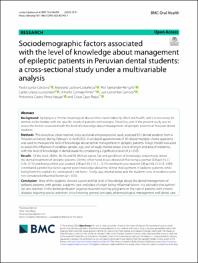Mostrar el registro sencillo del ítem
Sociodemographic factors associated with the level of knowledge about management of epileptic patients in Peruvian dental students: a cross‑sectional study under a multivariable analysis
| dc.contributor.author | Cayo Rojas, César Félix | |
| dc.contributor.author | Lurita‑Córdova, Paolo | |
| dc.contributor.author | Ladera-Castañeda, Marysela | |
| dc.contributor.author | Santander-Rengifo, Flor | |
| dc.contributor.author | López-Gurreonero, Carlos | |
| dc.contributor.author | Cornejo-Pinto, Alberto | |
| dc.contributor.author | Cervantes-Ganoza, Luis | |
| dc.contributor.author | Castro Pérez-Vargas, Antonieta | |
| dc.date.accessioned | 2023-02-04T15:16:23Z | |
| dc.date.available | 2023-02-04T15:16:23Z | |
| dc.date.issued | 2023-01-30 | |
| dc.identifier.uri | https://hdl.handle.net/20.500.14308/4324 | |
| dc.description.abstract | Background Epilepsy is a chronic neurological disease that could indirectly afect oral health, and it is necessary for dentists to be familiar with the specifc needs of patients with epilepsy. Therefore, aim of the present study was to assess the factors associated with the level of knowledge about management of epileptic patients in Peruvian dental students. Methods This analytical, observational, cross-sectional and prospective study assessed 312 dental students from a Peruvian university during February to April 2022. A validated questionnaire of 20 closed multiple-choice questions was used to measure the level of knowledge about dental management in epileptic patients. A logit model was used to assess the infuence of variables: gender, age, year of study, marital status, place of origin and area of residence, with the level of knowledge in dental students considering a signifcance level of p<0.05. Results Of the total, 28.8%, 36.2% and 34.9% had a poor, fair and good level of knowledge, respectively, about the dental treatment of epileptic patients. On the other hand, it was observed that being a woman (OR=0.44, CI 0.26–0.75) and being a third year student (OR=0.39, CI 0.21–0.74) and fourth year student (OR=0.43, CI 0.23–0.89) constituted a protective factor against poor knowledge about the dental management of epileptic patients, while being from the capital city constituted a risk factor. Finally, age, marital status and the students’ area of residence were not considered infuential factors (p>0.05). Conclusion Most of the students showed a poor and fair level of knowledge about the dental management of epileptic patients, with gender, academic year and place of origin being infuential factors. It is advisable that authori‑ ties and teachers in the dental profession organize recurrent training programs on the care of patients with chronic diseases requiring special attention, since knowing general concepts, pharmacological management and dental care of epileptic patients will allow future dentists to develop competencies to improve and implement good quality care protocols for this group of patients. | es_PE |
| dc.format | application/pdf | es_PE |
| dc.language.iso | en | es_PE |
| dc.publisher | BMC Oral Health | es_PE |
| dc.rights | info:eu-repo/semantics/openAccess | es_PE |
| dc.rights | Attribution-NonCommercial-NoDerivs 3.0 United States | * |
| dc.rights.uri | http://creativecommons.org/licenses/by-nc-nd/3.0/us/ | * |
| dc.source | Universidad Privada San Juan Bautista | es_PE |
| dc.source | Repositorio institucional - UPSJB | es_PE |
| dc.subject | Conocimiento | es_PE |
| dc.subject | Odontología | es_PE |
| dc.subject | Epilepsia | es_PE |
| dc.subject | Estudiantes | es_PE |
| dc.subject | Factores asociados | es_PE |
| dc.subject | Pacientes vulnerables | es_PE |
| dc.title | Sociodemographic factors associated with the level of knowledge about management of epileptic patients in Peruvian dental students: a cross‑sectional study under a multivariable analysis | es_PE |
| dc.type | info:eu-repo/semantics/article | es_PE |
| dc.subject.ocde | https://purl.org/pe-repo/ocde/ford#3.02.14 | es_PE |
| dc.publisher.country | GB | es_PE |
| dc.date.embargoEnd | 2023-02-06 | |
| dc.identifier.doi | https://doi.org/10.1186/s12903-023-02745-1 | es_PE |
| dc.type.version | info:eu-repo/semantics/publishedVersion | es_PE |
| upsjb.especialidad | Estomatología | es_PE |



